Wild morals and debauchery: what "The Thousand and One Nights" really tells about»
What do you know about the Arabian Nights? This is not a rhetorical question, because most people are content with a well-known stereotype: this is a well-known Arabic fairy tale about the beautiful Scheherazade, who became a hostage of the hard-hearted king Shahriyar, who every night got a new wife, and the next morning cut off her head. The eloquent girl, who so vividly tells fairy tales, drugged the king and thereby bought her freedom. And of course, among her stories were stories about Aladdin, Sinbad the sailor and other brave men, but it turned out that all this is complete nonsense.
The fairy tales have come down to us after many centuries of censorship and translation, so there is little left of the original. In fact, the heroes of Scheherazade's fairy tales were not as cute, kind and morally stable as the characters of the Disney cartoon. Therefore, if you want to keep a good memory of your favorite childhood characters, stop reading immediately. And for everyone else, welcome to a world you may not even have known existed.
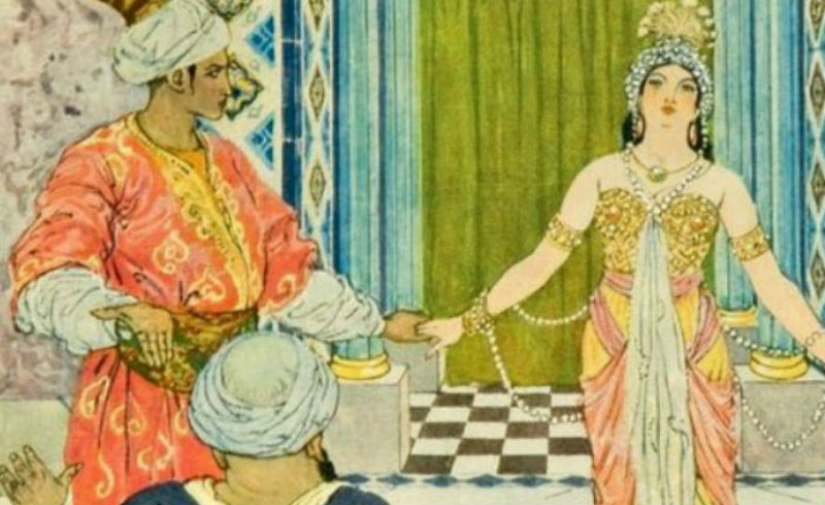
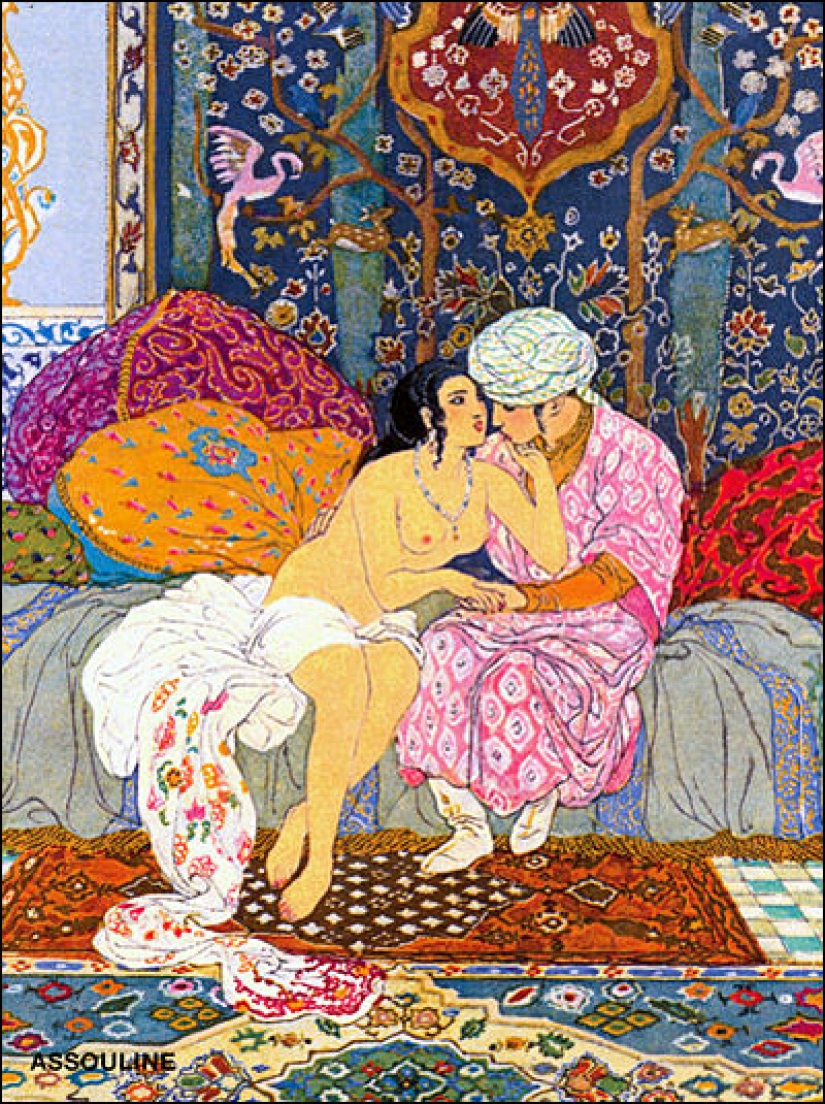
The first documented information describing the story of Scheherazade as a well-known work belongs to the pen of the tenth-century historian al-Masudi. In the future, the collection was repeatedly rewritten and modified depending on the time of life and the language of the translator, but the backbone remained the same, so we have reached if not the original story, then very close to the original.
It begins, oddly enough, not with the tears of a young beauty who is about to say goodbye to life, but with the story of two brothers, each of whom ruled his own country. After twenty years of separate rule, the elder brother, whose name was Shahriyar, invited the younger one, Shahzeman, to his domain. The latter agreed without hesitation, but as soon as he left the capital, he "remembered one thing" that he had forgotten in the city. On his return, he found his wife in the arms of a negro slave.
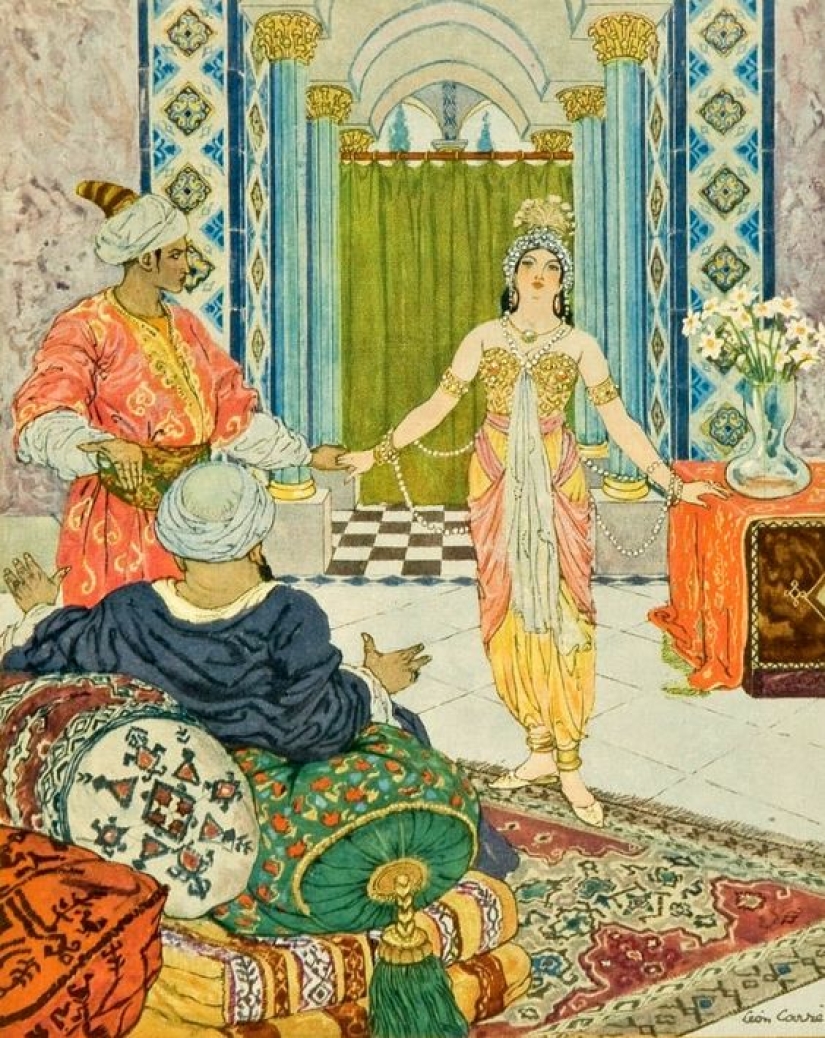
Enraged, the king slaughtered both of them, and then with a clear conscience went to his brother. At a party, he became sad because his wife was no longer alive, and he stopped eating. His older brother tried to cheer him up, but to no avail. Then Shahriyar offered to go hunting, but Shahzeman refused, continuing to sink into melancholy. So, sitting at the window and indulging in black melancholy, the unfortunate king saw how the wife of his absent brother arranged a threesome with the slaves at the fountain. The king immediately cheered up and thought: "Wow, my brother's going to have bigger problems."
Shahriyar returned from hunting, finding his brother with a smile on his face. He didn't have to pry for long, but he immediately told the truth. The reaction was unusual. Instead of acting like a younger brother, the older one suggested that they go on a trip and see if their wives cheat on other husbands.
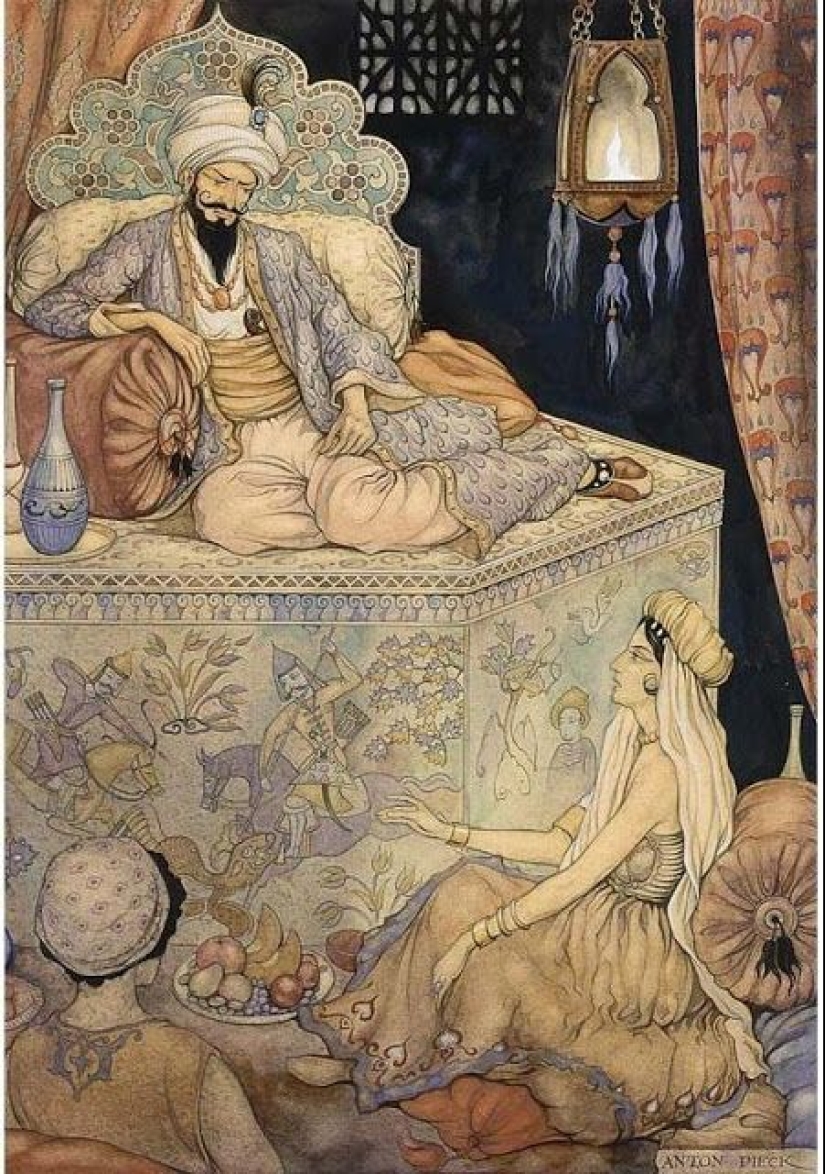
They were not lucky, and the journey was delayed: they could not find the unfaithful wives until they came to an oasis on the seashore. Jin emerged from the depths of the sea with a small chest under his arm. From the chest, he pulled out a woman (real) and said: "I want to sleep on you," and so I fell asleep. This woman, seeing the kings hiding on the palm tree, ordered them to come down and take possession of her right there on the sand. Otherwise, she would have woken Jin up and he would have killed them.
The kings agreed and granted her wish. After the act of love, the woman asked for rings from each of them. They were given away, and she added the jewels to the other five hundred and seventy that she kept in her casket. So that the brothers did not languish in guesses, the seductress explained that all the rings once belonged to men who possessed her in secret from the genie. The brothers looked at each other and said, "Wow, this genie is going to have bigger problems than us," and went back to their respective countries. After that, Shahriyar cut off the head of his wife and everyone who participated in the orgy, and he decided to take one girl per night.
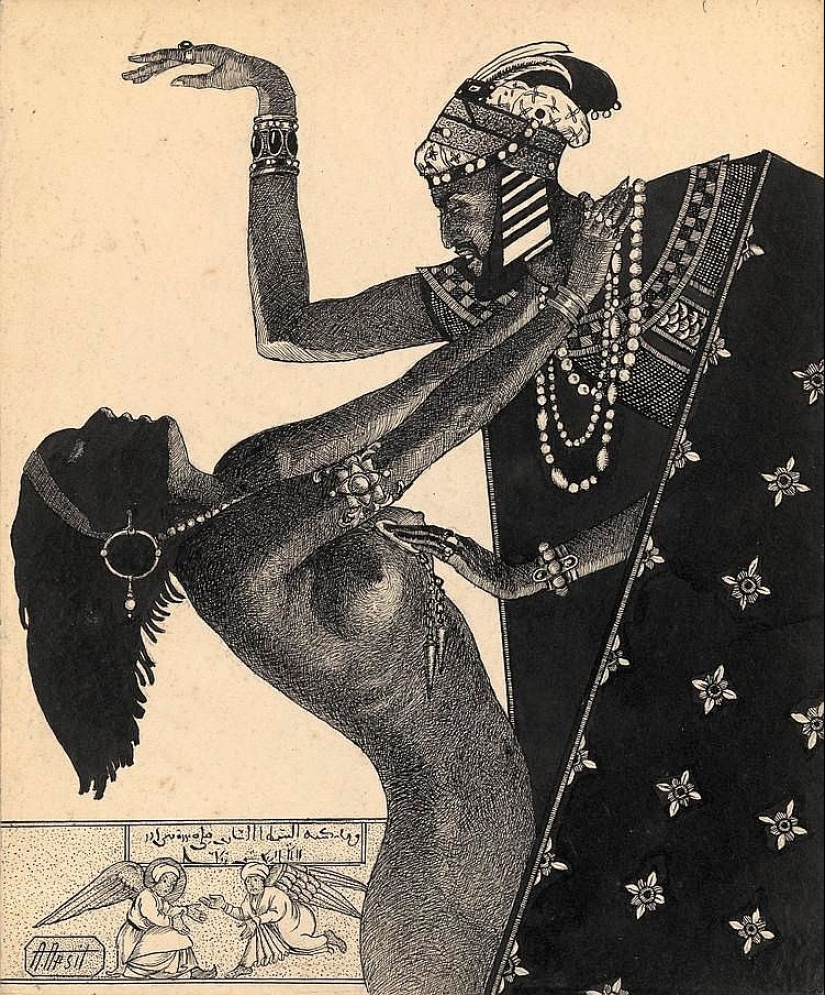
In our time, this story may seem sexist, but it is much more like a script for a porn movie. Think for yourself: no matter what the characters do, no matter where they go, they either have to watch the act of coitus, or participate in it. Similar scenes are repeated more than once throughout the book. Why, the younger sister of Scheherazade personally watched the wedding night of her relative: "And the king then sent for Dunyazada, and she came to her sister, embraced her, and sat down on the floor near the bed. And then Shahriyar took possession of Shahrazada, and then they began to talk."
Another distinctive feature of the tales of the thousand and one nights is that their characters act absolutely without reason, and often the events themselves look extremely ridiculous. Here, for example, is how the fairy tale of the first night begins. One day a merchant went to some country to collect debts. He felt hot, and sat down under a tree to eat dates and bread. "After eating a date, he threw a stone-and suddenly sees: in front of him is a tall Ifrit, and in his hands he has a naked sword. The Ifrit approached the merchant and said to him, " Get up, I will kill you as you killed my son!" And the ifrit answered: "When you ate the date and threw the stone, it hit my son in the chest, and he died in the same minute." Just think about it: the merchant killed the genie with a date stone. If only the enemies of Disney's Aladdin knew about this secret weapon.
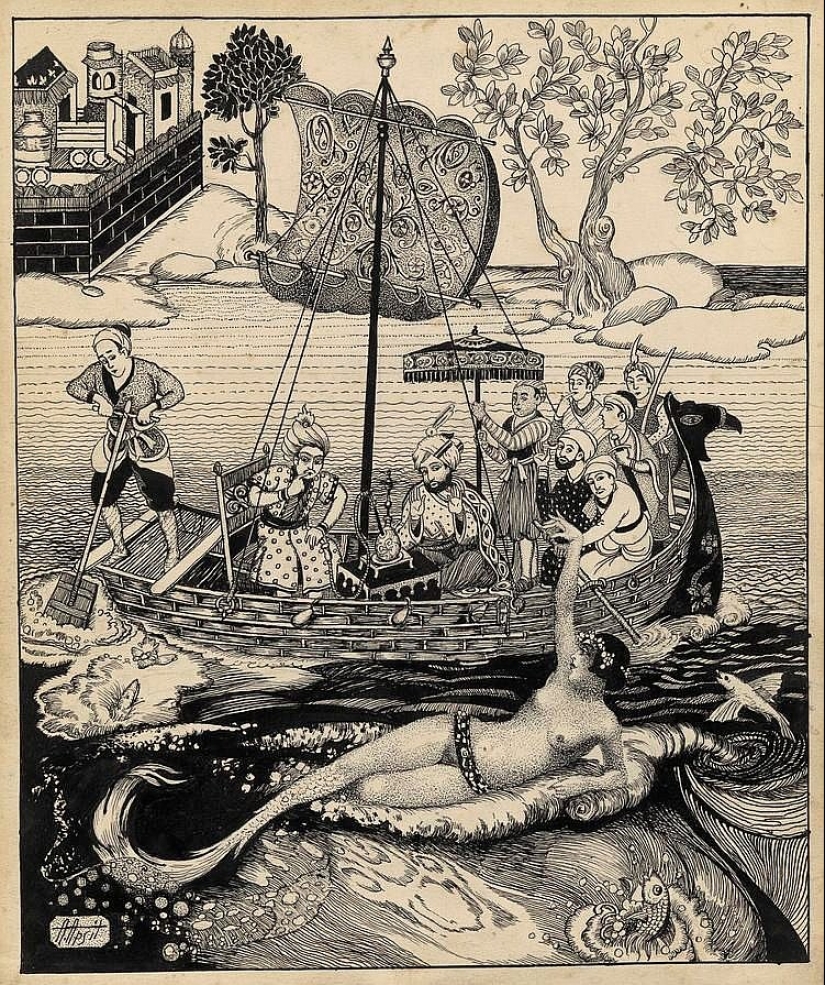
In our folk tale, too, there are many absurdities like: "The mouse ran, the tail waved, the pot fell, the testicles broke", but there are definitely not such crazy characters as in the story of the fifth night. It tells the story of King as-Sinbad, who for many years trained a falcon to help him in hunting. And then one day the king and his retinue caught a gazelle, and then the devil pulled him to say: "Anyone over whose head the gazelle jumps, will be killed." The gazelle, of course, jumped over the king's head. Then the subjects began to whisper: they say, why did the owner promise to kill everyone over whose head a gazelle jumps, and he still has not committed suicide. Instead of doing what he had promised, the king chased the gazelle, killed it, and hung the carcass on the rump of his horse.
While preparing to rest after the chase, the king came across a source of life-giving moisture dripping from a tree. Three times he took the cup, and three times the falcon tipped it over. Then the king was angry and cut off the falcon's wings, and the falcon pointed up with its beak, where a baby echidna was sitting on the branches of a tree, emitting poison. It's hard to say what the moral of this story is, but the character who told it in the book said that it was a parable about envy.
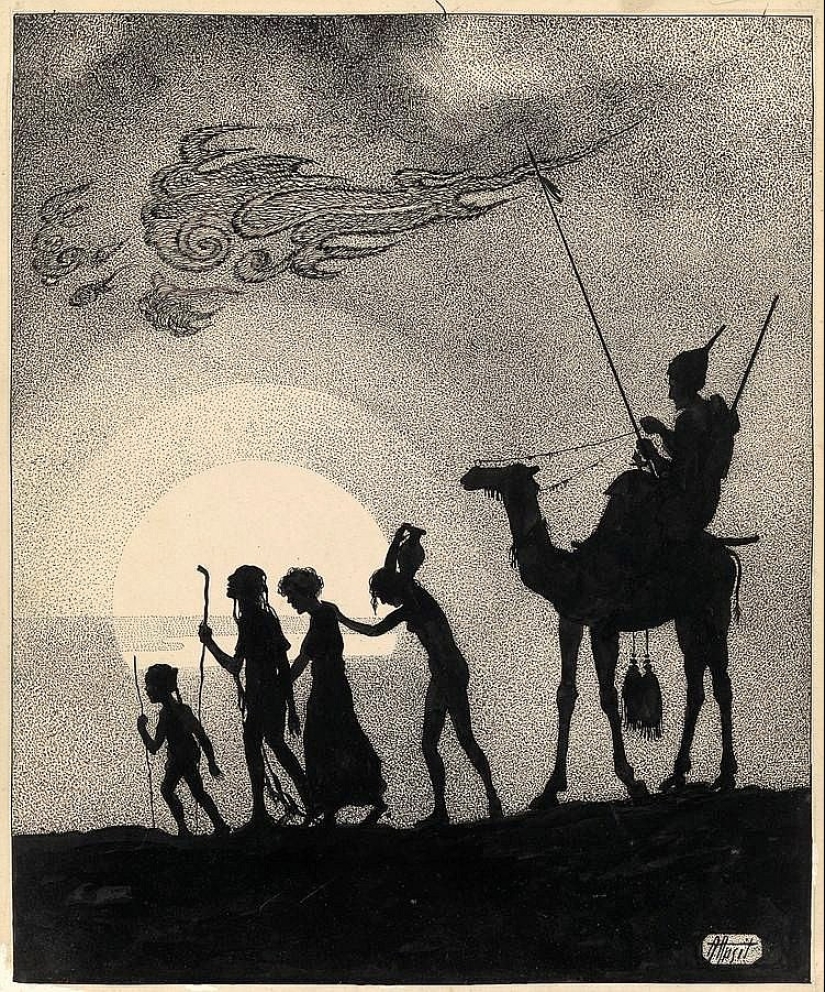
Of course, it is silly to demand from a book that is at least 11 centuries old, a coherent dramatic line. That is why the purpose of the above-described persiflage was not to make fun of it rudely, but to show that it can be a great read for the night, which will definitely make any modern person laugh. The tales of the Thousand and One Nights are a product of time, which, after passing through the centuries, has unwittingly turned into a comedy, and there is nothing wrong with that.
Despite the wide popularity of this historical monument, its film adaptations are incredibly small, and those that exist usually show the famous Aladdin or Sinbad the sailor. However, the most striking film version of the fairy tales was the French film of the same name. It does not retell all the plots of the book, but serves a bright and absurd story that is worthy of the films of "Monty Python" and at the same time corresponds to the crazy spirit of fairy tales.
For example, Shahriyar in the film is a king who dreams of simultaneously growing roses, composing poetry and touring in a traveling circus. The vizier is an old pervert who is so concerned about the king's absent-mindedness that he himself goes to bed with his wife, so that he will understand how flighty women are. And Scheherazade is a madcap girl who offers to make a baby for everyone she meets. By the way, she is played by a young and beautiful Catherine Zeta-Jones, who appears naked in front of the audience more than once during the entire tape. We've listed at least four reasons why you should watch this movie. Surely after this, you will want to read the Book of the Thousand and One Nights even more.
Keywords: Culture | History | Book | Censorship | Sex | Fairy tale | Literature | Original | Truth | Fairy tales | Translation
Post News ArticleRecent articles

It's high time to admit that this whole hipster idea has gone too far. The concept has become so popular that even restaurants have ...

There is a perception that people only use 10% of their brain potential. But the heroes of our review, apparently, found a way to ...
Related articles

In the fall of 1972, Bill Yates traveled through the countryside in the vicinity of Tampa, Florida. At that time, he was studying ...

These artists love cats, but also masterfully draw them, often complementing funny and life signatures. Meet! --> Russian ...

When a person is in a life-threatening situation is awful, but even worse when it happens to a child. 11-year-old American Terry ...

New Year's is a time to surprise and delight loved ones not only with gifts but also with a unique presentation of the holiday ...